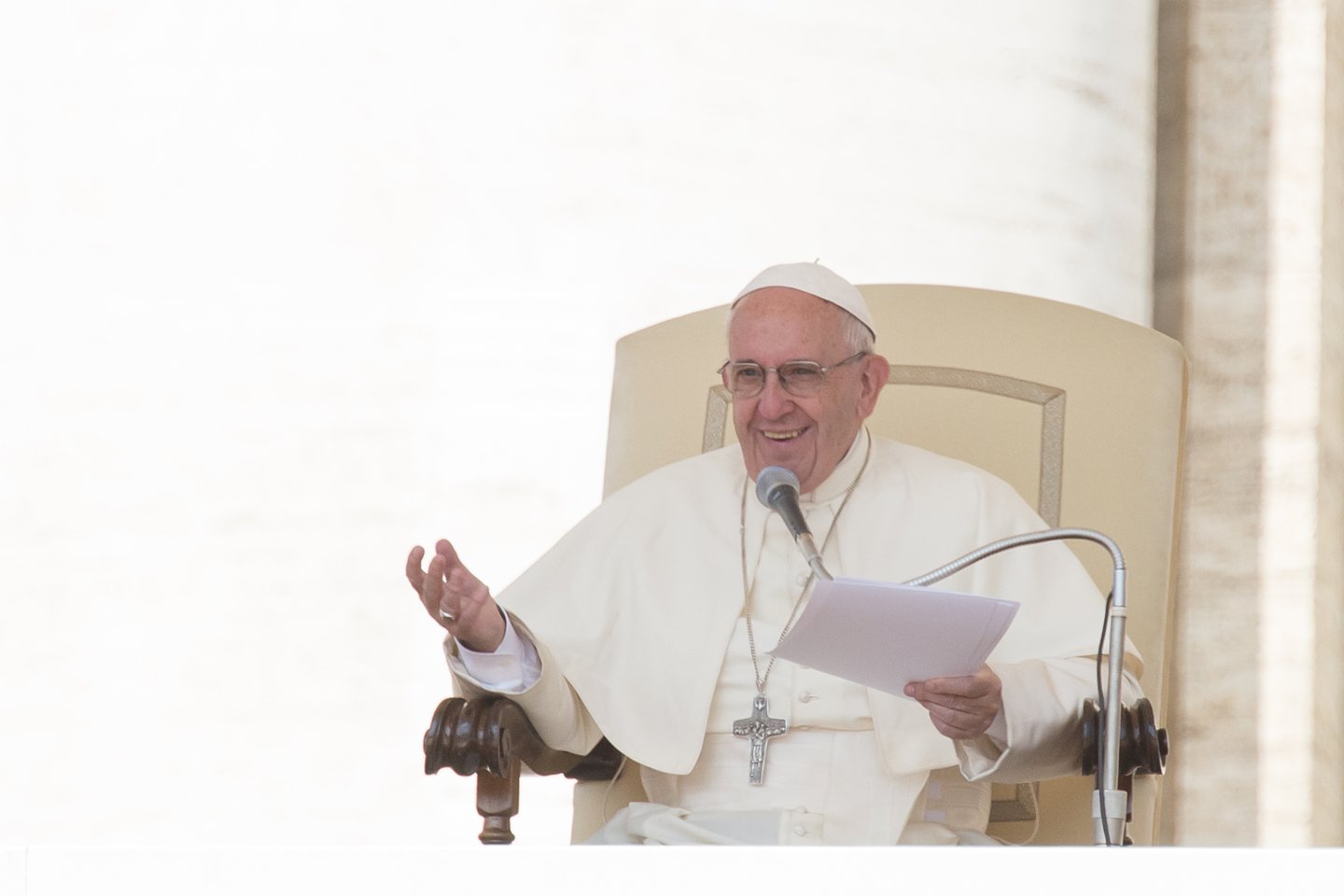“On the third day there was a marriage at Cana in Galilee…” (Jn. 2:1).
VATICAN CITY — Pope Francis on Wednesday continued his series of catechesis for the Year of Mercy, turning to the first of Jesus’ miracles — the changing of water into wine at the wedding feast of Cana (Jn 2:1-11).
In his address, the Holy Father focused on the reason why Jesus chose a wedding feast to perform his first miracle. “By initiating his public ministry at the wedding in Cana,” he told faithful and pilgrims gathered in St. Peter’s Square, “Jesus reveals himself as the Bridegroom of the People of God, announced by the prophets, and he reveals to us the depth of the relationship which unites us to him: it is a new Covenant of love.”
“What is the foundation of our faith?” he asked. “An act of mercy whereby Jesus bound us to himself. And the Christian life is the response to this love; it is like the story of two lovers.” Everything flows from this relationship, he said.
The Pope also reflected on the profound meaning of Mary’s words to the servants: “Do whatever he tells you,” her last recorded words in the Gospels.
Here below we publish an English translation of the pope’s catechesis.

The first sign of mercy: Cana (Jn 2:1-11)
Dear brothers and sisters,
Good morning. Before beginning the catechesis, I would like to greet a group of couples, in the back, who are celebrating 50 years of marriage. Yes, this is the “good wine” of the family. Yours is a witness that the newlyweds — whom I shall greet later — and young people need to learn. It is a beautiful witness. Thank you for your witness.
After commenting on several parables on mercy, today we consider the first of Jesus’ miracles, which the Evangelist John calls “signs,” because Jesus did not perform them to arouse wonder, but to reveal the Father’s love. The first of these miraculous signs is recounted by John (2:1-11) and takes place at Cana in Galilee. It is a kind of “portal of entry,” in which words and expressions that illuminate the entire mystery of Christ are etched and open the hearts of the disciples to faith. Let us look at some of them.
In the introduction we find the expression: “Jesus … with his disciples” (v. 2). Those whom Jesus had called to follow him, he joined to himself in a community and now, as one family, they are invited to the wedding feast.
By initiating his public ministry at the wedding in Cana, Jesus reveals himself as the Bridegroom of the People of God, announced by the prophets, and he reveals to us the depth of the relationship which unites us to him: it is a new Covenant of love. What is the foundation of our faith? An act of mercy whereby Jesus bound us to himself. And the Christian life is the response to this love; it is like the story of two lovers. God and man meet, they seek one another, they find one another, they celebrate one another, and they love one another: just like the lover and beloved in the Song of Songs. Everything else comes as a result of this relationship. The Church is the family of Jesus in which he pours out his love. It is this love which the Church guards and wants to give to everyone.
Within the context of the Covenant, we also understand Our Lady’s observation: “They have no wine” (v.3). How is it possible to celebrate a wedding and make merry if that which the prophets indicated was a characteristic element of the messianic banquet is missing (cf. Am 9:13-14; Joel 2:24; Is 25:6)? Water is needed to live, but wine expresses the abundance of the banquet and the joy of the celebration. It is a wedding feast lacking wine; the newlyweds are embarrassed by this. Imagine finishing a wedding feast drinking tea; it would be an embarrassment. Wine is necessary for the celebration.
In changing the water of the stone jars used “for the Jewish rites of purification” into wine (v. 6), Jesus performs an eloquent sign: he transforms the Law of Moses into the Gospel, the herald of joy. As John himself says elsewhere: “The law was given through Moses; grace and truth came through Jesus Christ” (1:17).
The words which Mary addresses to the servants crown the spousal portrait of Cana: “Do whatever he tells you” (v.5). It is interesting: they are her final words reported in the Gospels: they are the inheritance she leaves to us all. Today, too, Our Lady says to all of us: “Do whatever Jesus tells you.” It is the inheritance she has left us: it is beautiful! It is an expression which recalls the formula of faith used by the people of Israel on Sinai in response to the promises of the Covenant: “All that the Lord has spoken, we will do.” (Ex 19:8). And indeed at Cana the servants obey. “Jesus said to them: ‘Fill the jars with water.’ And they filled them up to the brim. He said to them: ‘Now draw some out, and take it to the steward of the feast.’ So they took it” (vv.7-8).
Truly, at this wedding, a New Covenant is stipulated, and to the servants of the Lord, that is to the whole Church, is entrusted the new mission: “Do whatever he tells you.” Serving the Lord means listening to his word and putting it into practice. It is the simple but essential recommendation of the Mother of Jesus, and it is the program of the Christian life. For each one of us, drawing from the stone jar is equivalent to entrusting oneself to God’s Word in order to experience its effectiveness in life. Then, together with the steward of the feast who tasted the water made wine, we too can now exclaim: “You have kept the good wine until now” (v.10). Yes, the Lord continues to reserve the good wine for our salvation, just as it continues to flow from the pierced side of the Lord.
The conclusion of the account sounds like a sentence: “This, the first of his signs, Jesus did at Cana in Galilee, and manifested his glory; and his disciples believed in him” (v.11). The wedding feast at Cana is much more than the simple account of Jesus’ first miracle. Like a treasure chest, he guards the secret of his person and the purpose of his coming: the long-awaited Bridegroom initiates the nuptials which are fulfilled in the Paschal Mystery. In these nuptials, Jesus binds his disciples to himself with a new and definitive Covenant. At Cana, Jesus’ disciples become his family and at Cana, the Church’s faith is born. To this wedding we are all invited, for the new wine shall never be lacking.

